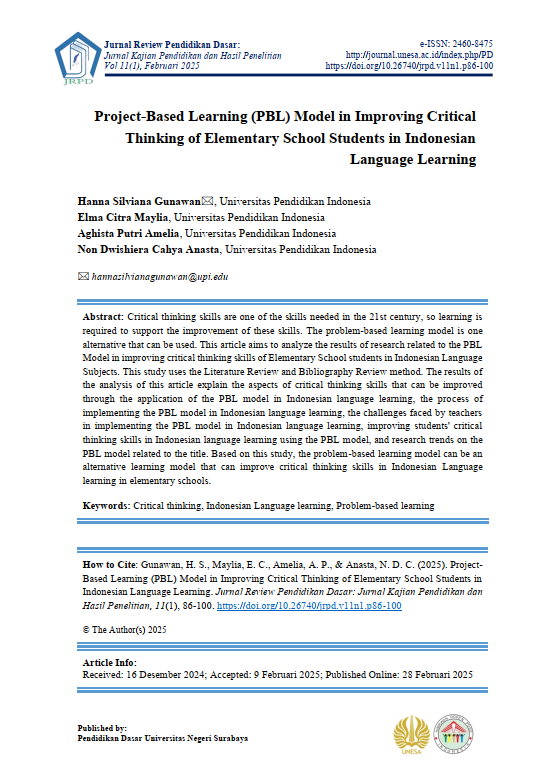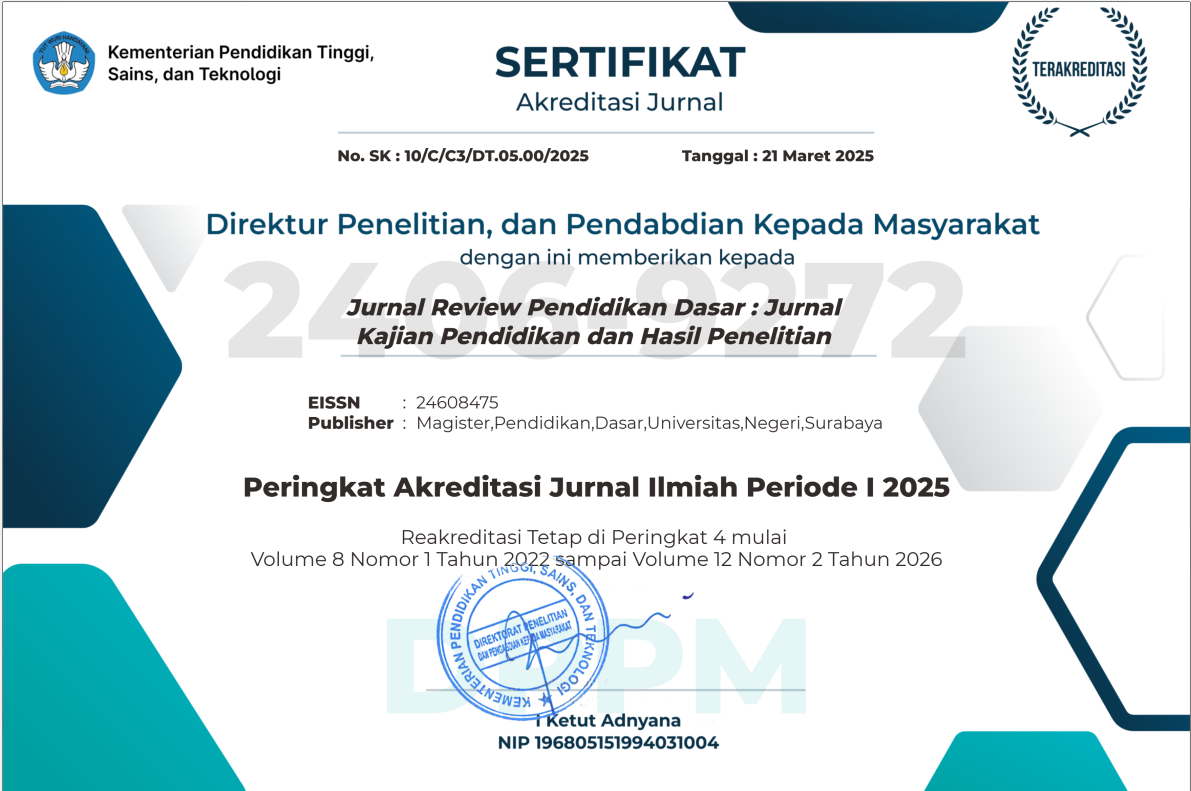Project-Based Learning (PBL) Model in Improving Critical Thinking of Elementary School Students in Indonesian Language Learning
Keywords:
Critical thinking, Indonesian Language learning, Problem-based learningAbstract
Critical thinking skills are one of the skills needed in the 21st century, so learning is required to support the improvement of these skills. The problem-based learning model is one alternative that can be used. This article aims to analyze the results of research related to the PBL Model in improving critical thinking skills of Elementary School students in Indonesian Language Subjects. This study uses the Literature Review and Bibliography Review method. The results of the analysis of this article explain the aspects of critical thinking skills that can be improved through the application of the PBL model in Indonesian language learning, the process of implementing the PBL model in Indonesian language learning, the challenges faced by teachers in implementing the PBL model in Indonesian language learning, improving students' critical thinking skills in Indonesian language learning using the PBL model, and research trends on the PBL model related to the title. Based on this study, the problem-based learning model can be an alternative learning model that can improve critical thinking skills in Indonesian Language learning in elementary schools.
References
Affandy, H., Sunarno, W., Suryana, R., & Harjana. (2024). Integrating creative pedagogy into problem-based learning: The effects on higher order thinking skills in science education. Thinking Skills and Creativity, 53, 101575. https://doi.org/10.1016/j.tsc.2024.101575
AlAli, R. (2024). Enhancing 21st Century Skills Through Integrated Stem Education Using Project-Oriented Problem-Based Learning. GeoJournal of Tourism and Geosites, 53(2), 421–430. https://doi.org/10.30892/gtg.53205-1217
Alt, D., & Raichel, N. (2022). Problem-based learning, self- and peer assessment in higher education: towards advancing lifelong learning skills. Research Papers in Education, 37(3), 370–394. https://doi.org/10.1080/02671522.2020.1849371
Anggraeni, D. M., Prahani, B. K., Suprapto, N., Shofiyah, N., & Jatmiko, B. (2023). Systematic review of problem based learning research in fostering critical thinking skills. Thinking Skills and Creativity, 49, 101334. https://doi.org/10.1016/j.tsc.2023.101334
Ardianti, R., Sujarwanto, E., & Surahman, E. (2022). Problem-based Learning: Apa dan Bagaimana. DIFFRACTION, 3(1), 27–35. https://doi.org/10.37058/diffraction.v3i1.4416
Dewi, E. K., & Jatiningsih, O. (2015). Pengaruh Penggunaan Model Pembelajaran Problem Based Learning terhadap kemampuan berpikir kritis siswa pada mata pelajaran PPKn kelas X DI SMAN 22 Surabaya. Jurnal Kajian Moral Dan Kewarganegaraan, 2(3), 936–950.
Dimitriadou, E., & Lanitis, A. (2023). A critical evaluation, challenges, and future perspectives of using artificial intelligence and emerging technologies in smart classrooms. Smart Learning Environments, 10(1), 12. https://doi.org/10.1186/s40561-023-00231-3
Evi, T., & Indarini, E. (2021). Meta analisis efektivitas model problem based learning dan problem solving terhadap kemampuan berpikir kritis mata pelajaran matematika siswa sekolah dasar. Edukatif: Jurnal Ilmu Pendidikan, 3(2), 385–395.
Fahrurrozi, F., Sari, Y., & Fadillah, J. (2022). Studi Literatur : Pemanfaatan Model Problem Based Learning terhadap Kemampuan Berpikir Kritis dalam Pembelajaran PKn Siswa Sekolah Dasar. EDUKATIF : JURNAL ILMU PENDIDIKAN, 4(3), 4460–4468. https://doi.org/10.31004/edukatif.v4i3.2795
Foo, Y. Z., O’Dea, R. E., Koricheva, J., Nakagawa, S., & Lagisz, M. (2021). A practical guide to question formation, systematic searching and study screening for literature reviews in ecology and evolution. Methods in Ecology and Evolution, 12(9), 1705–1720. https://doi.org/10.1111/2041-210X.13654
Hidayati, N., Zubaidah, S., & Amnah, S. (2022). The PBL vs. Digital Mind Maps Integrated PBL: Choosing Between the two with a view to Enhance Learners’ Critical Thinking. Participatory Educational Research, 9(3), 330–343. https://doi.org/10.17275/per.22.69.9.3
Hsbollah, H. M., & Hassan, H. (2022). CREATING MEANINGFUL LEARNING EXPERIENCES WITH ACTIVE, FUN, AND TECHNOLOGY ELEMENTS IN THE PROBLEM-BASED LEARNING APPROACH AND ITS IMPLICATIONS. Malaysian Journal of Learning and Instruction, 19. https://doi.org/10.32890/mjli2022.19.1.6
Iryanto, N. D. (2021). Meta Analisis Penerapan Model Pembelajaran Problem Based Learning (PBL) sebagai Sistem Belajar Mengajar Bahasa Indonesia Inovatif di Sekolah Dasar. Jurnal Basicedu, 5(5), 3829–3840. https://doi.org/10.31004/basicedu.v5i5.1415
Lenkauskaitė, J., Bubnys, R., Masiliauskienė, E., & Malinauskienė, D. (2021). Participation in the Assessment Processes in Problem-Based Learning: Experiences of the Students of Social Sciences in Lithuania. Education Sciences, 11(11), 678. https://doi.org/10.3390/educsci11110678
Lestari, F. P., Ahmadi, F., & Rochmad, R. (2021). The Implementation of Mathematics Comic through Contextual Teaching and Learning to Improve Critical Thinking Ability and Character. European Journal of Educational Research, volume-10-2021(volume-10-issue-1-january-2021), 497–508. https://doi.org/10.12973/eu-jer.10.1.497
Liberati, A., Altman, D. G., Tetzlaff, J., Mulrow, C., Gotzsche, P. C., Ioannidis, J. P. A., Clarke, M., Devereaux, P. J., Kleijnen, J., & Moher, D. (2009). The PRISMA statement for reporting systematic reviews and meta-analyses of studies that evaluate healthcare interventions: explanation and elaboration. BMJ, 339(jul21 1), b2700–b2700. https://doi.org/10.1136/bmj.b2700
Magaji, A. (2021). Promoting Problem-Solving Skills among Secondary Science Students through Problem Based Learning. International Journal of Instruction, 14(4), 549–566. https://doi.org/10.29333/iji.2021.14432a
Maylia, E. C., Amelia, A. P., Suwarna, D. M., Muyassaroh, I., & Jenuri, J. (2024). Strategi Pembelajaran Inkuiri Terhadap Kemampuan Berpikir Kritis Siswa SD. Jurnal Review Pendidikan Dasar : Jurnal Kajian Pendidikan Dan Hasil Penelitian, 10(1), 32–41. https://doi.org/10.26740/jrpd.v10n1.p32-41
Moltudal, S. H., Krumsvik, R. J., & Høydal, K. L. (2022). Adaptive Learning Technology in Primary Education: Implications for Professional Teacher Knowledge and Classroom Management. Frontiers in Education, 7. https://doi.org/10.3389/feduc.2022.830536
Rahmadana, J., Khawani, A., & Roza, M. (2023). Penerapan Model Problem Based Learning untuk Meningkatkan Kemampuan Berpikir Kritis Peserta Didik Sekolah Dasar. Jurnal Basicedu, 7(1), 224–230. https://doi.org/10.31004/basicedu.v7i1.4278
Rahmawati, L., & Juandi, D. (2022). PEMBELAJARAN MATEMATIKA DENGAN PENDEKATAN STEM: SYSTEMATIC LITERATURE REVIEW. Teorema: Teori Dan Riset Matematika, 7(1), 149. https://doi.org/10.25157/teorema.v7i1.6914
Razak, A. A., Ramdan, M. R., Mahjom, N., Zabit, M. N. Md., Muhammad, F., Hussin, M. Y. M., & Abdullah, N. L. (2022). Improving Critical Thinking Skills in Teaching through Problem-Based Learning for Students: A Scoping Review. International Journal of Learning, Teaching and Educational Research, 21(2), 342–362. https://doi.org/10.26803/ijlter.21.2.19
Ristiantita, M., Sari, A. Y., Azahra, N. A., Winarsih, I. O., Alkhoiri, M. F., Mubarak, M. F., & Mayarni, M. (2024). Analisis Strategi dan Metode Pembelajaran Bahasa Indonesia dengan Hasil Belajar Siswa di Sekolah Dasar Kelas 5. Jurnal Pendidikan Guru Sekolah Dasar, 1(3), 11. https://doi.org/10.47134/pgsd.v1i3.290
Rivas, S. F., Saiz, C., & Ossa, C. (2022). Metacognitive Strategies and Development of Critical Thinking in Higher Education. Frontiers in Psychology, 13. https://doi.org/10.3389/fpsyg.2022.913219
Safitri, N., Nuriman, N., Alfarisi, R., & Setya, C. (2024). Model Problem Based Learning Berbantuan Media Flipbook Terhadap Hasil Belajar Matematika Siswa SD. Jurnal Review Pendidikan Dasar : Jurnal Kajian Pendidikan Dan Hasil Penelitian, 10(3), 248–254. https://doi.org/10.26740/jrpd.v10n3.p248-254
Shanta, S., & Wells, J. G. (2022). T/E design based learning: assessing student critical thinking and problem solving abilities. International Journal of Technology and Design Education, 32(1), 267–285. https://doi.org/10.1007/s10798-020-09608-8
Smith, K., Maynard, N., Berry, A., Stephenson, T., Spiteri, T., Corrigan, D., Mansfield, J., Ellerton, P., & Smith, T. (2022). Principles of Problem-Based Learning (PBL) in STEM Education: Using Expert Wisdom and Research to Frame Educational Practice. Education Sciences, 12(10), 728. https://doi.org/10.3390/educsci12100728
Syafitri, E., Armanto, D., & Rahmadani, E. (2021). AKSIOLOGI KEMAMPUAN BERPIKIR KRITIS (Kajian Tentang Manfaat dari Kemampuan Berpikir Kritis). JOURNAL OF SCIENCE AND SOCIAL RESEARCH, 4(3), 320. https://doi.org/10.54314/jssr.v4i3.682
Wang, C.-C. (2021). The process of implementing problem-based learning in a teacher education programme: an exploratory case study. Cogent Education, 8(1). https://doi.org/10.1080/2331186X.2021.1996870
Yu, H. (2024). RETRACTED: Enhancing creative cognition through project-based learning: An in-depth scholarly exploration. Heliyon, 10(6), e27706. https://doi.org/10.1016/j.heliyon.2024.e27706
Zakiah, L., & Lestari, I. (2019). Berpikir kritis dalam konteks pembelajaran. Bogor: Erzatama Karya Abadi, 4.

Downloads
Published
How to Cite
Issue
Section
License
Copyright (c) 2025 Jurnal Review Pendidikan Dasar : Jurnal Kajian Pendidikan dan Hasil Penelitian

This work is licensed under a Creative Commons Attribution 4.0 International License.
 Abstract views: 504
,
Abstract views: 504
, PDF Downloads: 528
PDF Downloads: 528



